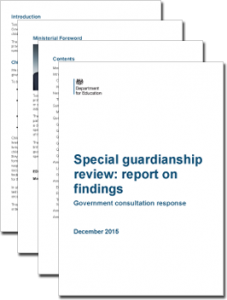Positive changes for those involved in undertaking Special Guardianship Orders (SGO) or connected kinship  assessments.
assessments.
This legal briefing outlines the changes introduced by the Interim Guidance issued by the Family Justice Council and the interim report of the public working group.
Interim Guidance on SGOs
In May 2019, The Family Justice Council issued interim guidance on Special Guardianship. This has been approved by the current President of the Family Division, Sir Andrew McFarlane, and addresses some of the concerns about special guardianship orders identified by the former President, Sir James Munby, in the Court of Appeal judgement of Re P-S (Children) [2018]. This has been followed by the Public Law Working Group’s interim report issued in June 2019 titled Recommendations to achieve best practice in child protection and family justice systems.which includes some very helpful sections on SGOs that have been incorporated in this legal briefing.
This interim guidance on Special Guardianship is produced as a result of the Family Justice Council’s close working with the:
- President’s Public Law Working Group, chaired by Mr Justice Keehan and
- Researchers commissioned by the Nuffield Family Justice Observatory, and led by CoramBAAF in partnership with Lancaster University, to review the research evidence on special guardianship.
It should be noted that this is interim guidance, with more fuller guidance to follow later in the year. The good news for practitioners is the guidance can be relied on straight away, being effective immediately.
Recommendations to achieve best practice in child protection and family justice systems
This interim report of the Public Law Working group was published in June 2019. This report takes into the account the interim guidance on SGOs and the research as detailed above.
As with the interim guidance, the recommendations in this interim report are in draft and further to the consultation process ,will be revised at a later date.
Timescales for Assessments
The interim guidance addresses a key all too familiar situation where very short timescales of at times 6-8 weeks or worryingly even less were being granted by the court in care proceedings for the completion of a an assessment. These short timescales being made in order to fit in with the management and compliance of the statutory 26 weeks deadline as set out in the Public Law Outline for care proceedings.
This guidance takes into account the essential principle that timescales for completion of assessments need to reflect the complexities of the assessment, and not be dictated by the statutory timescales.
Practitioners will already be aware that delays in children proceedings should always be avoided. However the positive news is that if an extension to the 26 week time limit is now required, in order to undertake a full an assessment of potential Special Guardians it should be granted if it is to “enable the court to resolve the proceedings justly” [s.32(5) Children Act 1989]
What does the guidance say:
- Alternative potential carers should be identified as early as possible and where possible prior to the issue of proceedings, in the pre proceedings stage by convening a Family Group Conference
- Assessments should be commenced promptly and be evidence based, balanced and child-centred. If a full assessment is required it will usually require a 3-month timescale.
Whether the local authority is commencing the assessment itself or commissioning an external agency or an independent social worker, the assessment report must comply with the schedule as set out in Regulation 21, Special Guardianship Regulations 2005 as amended by the Special Guardianship (Amendment) Regulations 2015.
Click here to read previous briefings on the changes introduced by the 2015 regulations.
(For Wales – Regulation 2, Special Guardianship (Wales) Regulations 2005 as amended by the Special Guardianship (Wales) (Amendment) Regulations 2018).
The interim guidance refers to very helpful models of good practice guides that should be followed in the assessment of Special Guardians. These are:
- Timetabling and timescales for full family and friends assessments and the
- Family Rights Group Assessment Template (Annex C)
3. If care proceedings have commenced the following should be undertaken:
-
- All parties (including the Child/ren’s Guardian) should file and serve position statements in advance of the first Case Management Hearing to include details of proposed carers for assessment by the local authority.
- The social work statement should identify potential carers clearly by reference to a genogram.
- the Child/ren’s Guardian’s Initial Analysis/position statement should explicitly address the identification of carers and their contact details.
4. The interim guidance clearly states that:
- The identification of the carers should not be governed by the parents’ approval or disapproval but must be focused on the child’s interests.
- If the whereabouts of prospective carers are unknown, the family or, if appropriate, other agencies should be invited to assist in locating them.
- If the viability assessment is negative, the local authority must notify the subject of the assessment of their ability to seek independent legal advice and to challenge the assessment, including the procedure for any application to the court
5. The guidance acknowledges that in most cases, compliance with good practice will ensure that any prospective special guardian has been identified at an early stage and the assessment completed within the statutory timescale.
-
- The identification of the carers should not be governed by the parents’ approval or disapproval but must be focused on the child’s interests.
- If the whereabouts of prospective carers are unknown, the family or, if appropriate, other agencies should be invited to assist in locating them.
- If the viability assessment is negative, the local authority must notify the subject of the assessment of their ability to seek independent legal advice and to challenge the assessment, including the procedure for any application to the court.
- The guidance acknowledges that in most cases, compliance with good practice will ensure that any prospective special guardian has been identified at an early stage and the assessment completed within the statutory timescale.
Extensions will be permitted beyond 26 weeks
The guidance recognises that there will be cases where possible carers are identified late in the proceedings or for other reasons further time may be required to assess the relationship between the child/ren and the carer(s) fully.
- The issue of later identification of potential carers was addressed by Sir James Munby, in Re S (A Child) [2014]. In summary, a proposal for assessment of a late entrant to the proceedings must be realistic and not merely a trawl though all possible options, however unlikely.
- If the application has a sound basis, an extension beyond 26 weeks should be permitted if it is, “necessary to enable the court to resolve the proceedings justly” [section 32(5) Children Act 1989] and as such will be readily justified as required by section 32(7) Children Act.
- Where the proposed carers appear to be viable, the assessment of carers living in another country will also justify an extension of 26 weeks. In these circumstances time may be needed for an agency such as Children and Families Across Borders (CFAB) to carry out an assessment and there may unavoidable delays which will, quite properly, take the case beyond 26 weeks.
- Where more time is needed to assess the quality of the relationship between the child and the proposed carers and to ensure the stability of the placement
- This is likely to arise after the court has undertaken the welfare evaluation in terms of the possible arrangements for the child/ren. Whilst circumstances vary widely, it is likely that this will lead to an extension of the timetable, particularly if the court has indicated that this is the preferred placement.
- The extension period will depend on the individual features of the case but any delay should be proportionate to the welfare criteria set out at sections 1(3) and 1(4) Children Act 1989.
- The interim report by the Public Law Working Group recommends that timetabling for SGO assessments and the support plans should be realistic, robust, comprehensive and compliant with the regulations. It also recommends that if further time is needed to build relationships between the child and the proposed special guardian, then extension of the 26 week will be needed.
7. Where a viability assessment is positive, the parties and the court should, when making directions for a full SGO assessment, consider, and if necessary, make orders relating to, the time the children will spend with the proposed carers. An evidence-based assessment which does not include any assessment of the proposed carers’ relationship with the child is likely to be regarded as incomplete.
This is supported by the recommendations of the interim report by the Public Law Working Group which states that Special Guardianship assessments should include a renewed emphasis on the child/special guardian relationship, with special guardians caring for children on an interim basis pre final hearing decision. It also recommends better training for special guardians and a renewed emphasis on parental contact.
8. If the court approves an extension, consideration will need to be given to the legal framework. In some circumstances it may not be possible for the child to be placed pursuant to an interim care order under the current regime imposed by Regulation 24 of The Care Planning, Placement and Case Review (England) Regulations 2010. In these circumstances, an alternative approach would be placement pursuant to section 8 Children Act: such as the granting of a Child Arrangements Order and perhaps an interim Supervision Order to provide support for the placement, particularly during any transition period. The court and the parties should be mindful of the consequences arising out of any change to the legal framework, particularly if the child is no longer a “looked after” child pursuant to section 22 Children Act 1989.
Supervision Orders
The interim report recommends that if there is a robust and comprehensive special guardianship assessment and support plan then a Supervision order should not be needed to be made alongside a SGO.
Conclusion
As identified by the government’s review of SGOs in 2015, SGOs can be a positive option for a significant group of children irrespective of age.
They are good permanency option for those children who may at times be difficult to place, particularly those that are already placed and settled with relatives or foster carers, where the children are already thriving in their care.
SGOs are therefore a valuable option within the menu of legal permanency options to enable children to remain within their family or connected persons network.
This interim guidance combined with the recommendations of the interim report provides essential and very much awaited support to practitioners in producing robust and evidence-based assessments within the required and proportionate timescales.
With the clear recognition that a full assessment cannot be completed in less than 12 weeks, thereby dramatically reducing the risks, identified in those tragic serious case reviews. Sufficient time for practitioners will ensure children will not be placed with Special Guardians with insufficient robust assessments, inadequate preparation of the special guardians and lack of consideration of the necessary support required. Resulting in the lesser likelihood for such tragic cases arising in the future or placement breakdowns.
How we can help
We are specialist in providing legal and social care training. If you require bespoke and practical skilled based training on, SGOs and related subjects please contact us or call us on 01908 969 039 for a no obligation discussion.
Copyright:The content of this legal briefing is copyright of Kingsley Knight Training. It can be printed and downloaded free of charge in an unaltered form on a temporary basis, for personal use or reference purposes. However it is prohibited for any content printed or downloaded to be sold, licensed, transferred, copied or reproduced in whole or in part in any manner or in or on any media to any person without the prior consent of Kingsley Knight
Disclaimer:The contents of this guide are for information and are not intended to be relied upon as legal advice
